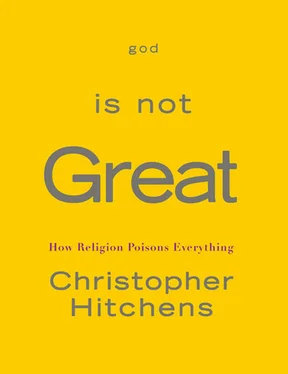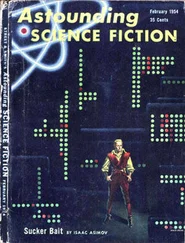If anything proves the human manufacture of religion, it is the way that the Mormon elders resolved this difficulty. Confronted by the plain words of one of their holy books and the increasing contempt and isolation that it imposed upon them, they did as they had done when their fondness for polygamy would have brought federal retribution upon god’s own Utah. They had still another “revelation” and, more or less in time for the passage of the Civil Rights Act of 1965, had it divinely disclosed to them that black people were human after all.
It must be said for the “Latter-day Saints” (these conceited words were added to Smith’s original “Church of Jesus Christ” in 1833) that they have squarely faced one of the great difficulties of revealed religion. This is the problem of what to do about those who were born before the exclusive “revelation,” or who died without ever having the opportunity to share in its wonders. Christians used to resolve this problem by saying that Jesus descended into hell after his crucifixion, where it is thought that he saved or converted the dead. There is indeed a fine passage in Dante’s Inferno where he comes to rescue the spirits of great men like Aristotle, who had presumably been boiling away for centuries until he got around to them. (In another less ecumenical scene from the same book, the Prophet Muhammad is found being disemboweled in revolting detail.) The Mormons have improved on this rather backdated solution with something very literal-minded. They have assembled a gigantic genealogical database at a huge repository in Utah, and are busy filling it with the names of all people whose births, marriages, and deaths have been tabulated since records began. This is very useful if you want to look up your own family tree, and as long as you do not object to having your ancestors becoming Mormons. Every week, at special ceremonies in Mormon temples, the congregations meet and are given a certain quota of names of the departed to “pray in” to their church. This retrospective baptism of the dead seems harmless enough to me, but the American Jewish Committee became incensed when it was discovered that the Mormons had acquired the records of the Nazi “final solution,” and were industriously baptizing what for once could truly be called a “lost tribe”: the murdered Jews of Europe. For all its touching inefficacy, this exercise seemed in poor taste. I sympathize with the American Jewish Committee, but I nonetheless think that the followers of Mr. Smith should be congratulated for hitting upon even the most simpleminded technological solution to a problem that has defied solution ever since man first invented religion.
CHAPTER TWELVE
A Coda: How Religions End
It can be equally useful and instructive to take a glimpse at the closing of religions, or religious movements. The Millerites, for example, are no more. And we shall not hear again, in any but the most vestigial and nostalgic way, of Pan or Osiris or any of the thousands of gods who once held people in utter thrall. But I have to confess to a slight sympathy, that I have tried and failed to repress, for Sabbatai Sevi, the most imposing of the “false Messiahs.” In the mid-seventeenth century, he galvanized whole Jewish communities across the Mediterranean and the Levant (and as far afield as Poland, Hamburg, and even Amsterdam, repudiator of Spinoza) with his claim to be the chosen one who would lead the exiles back to the Holy Land and begin the era of universal peace. His key to revelation was the study of the Kabbalah—more recently revived in fashion by a showbiz woman bizarrely known as Madonna—and his arrival was greeted by hysterical Jewish congregations from his home base in Smyrna to Salonika, Constantinople, and Aleppo. (The rabbis of Jerusalem, having been inconvenienced by premature messianic claims before, were more skeptical.) By the use of Kabbalistic conjury that made his own name the equivalent of “Mosiach” or “Messiah” when unscrambled from a Hebrew anagram, he may have persuaded himself, and certainly persuaded others, that he was the expected one. As one of his disciples phrased it:
The prophet Nathan prophesied and Sabbatai Sevi preached that whoever did not mend his ways would not behold the comforting of Zion and Jerusalem, and that they would be condemned to shame and to everlasting contempt. And there was a repentance, the like of which has never been seen since the world was created and unto this day.
This was no crude “Millerite” panic. Scholars and learned men debated the question passionately and in writing, and as a consequence we have a very good record of events. All the elements of a true (and a false) prophecy were present. Sabbatai’s devotees pointed to his equivalent of John the Baptist, a charismatic rabbi called Nathan of Gaza. Sabbatai’s enemies described him as an epileptic and a heretic, and accused him of violating the law. They in turn were stoned by Sabbatai’s partisans. Convocations and congregations raged together, and raged against each other. On a voyage to announce himself in Constantinople, Sabbatai’s ship was storm-tossed yet he rebuked the waters, and when incarcerated by the Turks his prison was illuminated with holy fires and sweet scents (or not, according to many discrepant accounts). Echoing a very harsh Christian dispute, the supporters of Rabbi Nathan and Sabbatai maintained that without faith, knowledge of the Torah and the performance of good works would be unavailing. Their opponents asserted that the Torah and good works were the main thing. So complete in every respect was the drama that even the stubbornly anti-Sabbatai rabbis in Jerusalem at one point asked to be told if any verifiable miracles or signs had been attached to the claimant who was intoxicating the Jews with joy. Men and women sold all that they had and prepared to follow him to the Promised Land.
The Ottoman imperial authorities had a good deal of experience in dealing with civil unrest among confessional minorities at the time (they were just in the process of wresting Crete from the Venetians) and behaved with much more circumspection than the Romans are supposed to have done. They understood that if Sabbatai was to claim kingdom over all kings, let alone to claim a large tract of their province in Palestine, then he was a secular challenger as well as a religious one. But when he arrived in Constantinople, all they did was lock him up. The ulema, or Muslim religious authority, was likewise sagacious. They counseled against the execution of this turbulent subject, lest his enthused believers “make a new religion.”
The script was almost complete when a former disciple of Sabbatai’s, one Nehemiah Kohen, came to the grand vizier’s headquarters in Edirne and denounced his former master as a practitioner of immorality and heresy. Summoned to the vizier’s palace, and allowed to make his way from prison with a procession of hymn-singing supporters, the Messiah was very bluntly asked if he would agree to a trial by ordeal. The archers of the court would use him as a target, and if heaven deflected the arrows he would be adjudged genuine. Should he refuse, he would be impaled. If he wished to decline the choice altogether, he could affirm himself to be a true Muslim and be allowed to live. Sabbatai Zevi did what almost any ordinary mammal would have done, made the standard profession of belief in the one god and his messenger and was awarded a sinecure. He was later deported to an almost Judenrein part of the empire, on the Albanian-Montenegrin border, and there expired, supposedly on Yom Kippur 1676, at the precise hour of the evening prayer when Moses is said to have breathed his last. His grave, much sought, has never been conclusively identified.
His distraught followers immediately divided into several factions. There were those who refused to believe in his conversion or apostasy. There were those who argued that he had only become a Muslim in order to be an even greater Messiah. There were those who felt that he had only adopted a disguise. And of course there were those who claimed that he had risen into the heavens. His true disciples eventually adopted the doctrine of “occultation,” which, it may not surprise you to learn, involves the belief that the Messiah, invisible to us, has not “died” at all but awaits the moment when humanity will be ready for his magnificent return. (“Occultation” is also the term employed by pious Shia, to describe the present and long-standing condition of the Twelfth Imam or “Mahdi”: a child of five who apparently vanished from human view in the year 873.)
Читать дальше












